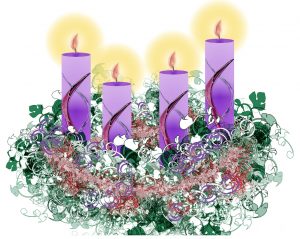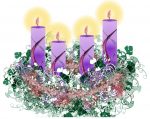Notice During the Covid-19 Outbreak
In solidarity, we at the Interfaith Peace Project stand together in these times of heart break and upset. Some of you may have lost friends or family members. Some of you may have lost your job and your income; some may be working overtime to help with the crisis. Some of you may be home and alone and some may be trying to figure out a new way to live. Please let us know how we can help. If you would like a phone appointment with any of us, give us a call.You may call or email Tom at:
_______________

© t0m15 stock.adobe.com
December 20, 2020
SAYING “YES”
The Fourth Sunday of Advent
The Fourth Sunday of Advent
by Thomas P. Bonacci, C.P.
The First Reading for the Fourth Sunday of Advent from II Samuel 7 concerns King David’s desire to build a Temple for his God. This seems like a noble and worthwhile project. King David dwells in luxury, while the “House” of God is a movable Tent. David aims to rectify the situation by constructing a Temple to the glory and honor of God. God, however, is not impressed.
The Hebrew Scripture surprises us at several critical junctures. The Scripture sets provisional standards on Moses and the Israelites before they may enter the Land of Promise. They will only prosper if they practice justice by not oppressing the poor and the alien (see Exodus 23: 1-9). Through the Prophet Samuel, God cautions the people against desiring a king “like the Nations” (see I Samuel 8: 1-9). In II Samuel 7: 1-17, the Prophet Nathan confronts David concerning his desire to build a Temple. The Lord of Heaven and Earth has no desire to shelter in place. Why all this hesitation and caution?
Rabbi Abraham Heschel wrote, “Religion has often done more to petrify the sacred than sanctify the secular.” Land, King, and Temple are three aspects of the religious enterprise always in need of review if not reform.
We are often tempted to think the land under our feet is ours to do with as we please. We justify this by believing God gave the land to us exclusively. The Scripture teaches the Earth belongs to God (see Psalm 24: 1). Nations are tempted to think they have a divine privilege over and against other people forgetting God is the God of all (Genesis 1: 27). Worship places can quickly become exclusion centers, compromising the justice and compassion essential to the faithful worship of God (see Isaiah 1: 11-17).
In the last analysis, God takes the initiative to bless all people. God is humble of heart, desiring nothing but the care of the poor and the welcoming of the stranger.
Mary, the soon to be Mother of Jesus, emerges for the first time in the Gospel for the Fourth Sunday of Advent (Luke 1: 26-38). She is visited by an Angel of the Lord who announces to her the divine favor by which she will give birth to Jesus.
Past emphasis has focused on the virtue of Mary. Luke has something else in mind. Apart from any virtue Mary may have had, she receives God’s favor as Moses was favored. Mary symbolizes the poor, marginalized, and forgotten of this World. She does not stand isolated from the rest of humanity. This courageous woman knows something about oppression, desiring never to oppress another. She is the Mother of those whose hopes will not be crushed.
The Gospel for this Advent Sunday concludes with Mary’s bold response to the Angel Gabriel, “Be it done to me according to your word.” In that precise moment, hope was born anew. Mary stands in the heart of the great tradition of countless people who say “Yes” to God by not saying “No” to the poor or the stranger (see Luke 1: 46-55). Such courage blesses the World, especially in challenging times.
Blessings to you, Holy Community, for saying “Yes” to God as you pursue the affairs of everyday life. Never let a day go by without discerning how the Lord has blessed you, and you have blessed us.


Off